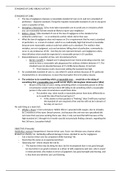Summary
Summary Tort Law: Negligence - Standard of Care and Breach of Duty
- Course
- Institution
- Book
I achieved a high first class (78%) using these notes for Tort Law These are the notes I made from the Principles of Tort Law (Rachel Mulheron) textbook for Standard of Care and Breach of Duty in Negligence cases. The notes are laid out in a problem question format - so in the exam you can pretty ...
[Show more]




